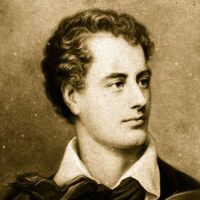To a Lady Who Presented to the Author a Lock of Hair Braided With His Own, and Appointed a Night in December to Meet Him in the Garden
These locks, which fondly thus entwine,
In firmer chains our hearts confine,
Than all th’ unmeaning protestations
Which swell with nonsense, love orations.
Our love is fix’d, I think we’ve prov’d it;
Nor time, nor place, nor art have mov’d it;
Then wherefore should we sigh and whine,
With groundless jealousy repine;
With silly whims, and fancies frantic,
Merely to make our love romantic?
Why should you weep, like Lydia Languish,
And fret with self—created anguish?
Or doom the lover you have chosen,
On winter nights to sigh half frozen;
In leafless shades, to sue for pardon,
Only because the scene’s a garden?
For gardens seem, by one consent,
(Since Shakespeare set the precedent;
Since Juliet first declar’d her passion)
To form the place of assignation.
Oh! would some modern muse inspire,
And seat her by a sea—coal fire;
Or had the bard at Christmas written,
And laid the scene of love in Britain;
He surely, in commiseration,
Had chang’d the place of declaration.
In Italy, I’ve no objection,
Warm nights are proper for reflection;
But here our climate is so rigid,
That love itself, is rather frigid:
Think on our chilly situation,
And curb this rage for imitation.
Then let us meet, as oft we’ve done,
Beneath the influence of the sun;
Or, if at midnight I must meet you,
Within your mansion let me greet you:
There, we can love for hours together,
Much better, in such snowy weather,
Than plac’d in all th’ Arcadian groves,
That ever witness’d rural loves;
Then, if my passion fail to please,
Next night I’ll be content to freeze;
No more I’ll give a loose to laughter,
But curse my fate, for ever after.



